Exploring Descartes' Method of Doubt: A Critical Analysis
VerifiedAdded on 2023/06/11
|6
|1723
|153
Essay
AI Summary
This essay provides an analysis of René Descartes' Method of Doubt, a form of methodological skepticism aimed at ascertaining the ultimate truth by systematically doubting beliefs and existence. The essay explores the four-step process of the method, including accepting previously proven truths, breaking down facts into smaller units, solving smaller problems first, and compiling a comprehensive list of potential future problems, culminating in the statement "Cogito ergo sum" (I think, therefore I am). The analysis also presents criticisms of Descartes' theory, such as the reliability of senses, the continuity of reality versus dreams, and challenges to the Cogito argument, while highlighting Descartes' counterarguments and the method's overall contribution to questioning and establishing individual identity. Desklib provides access to this and other solved assignments to aid students in their studies.
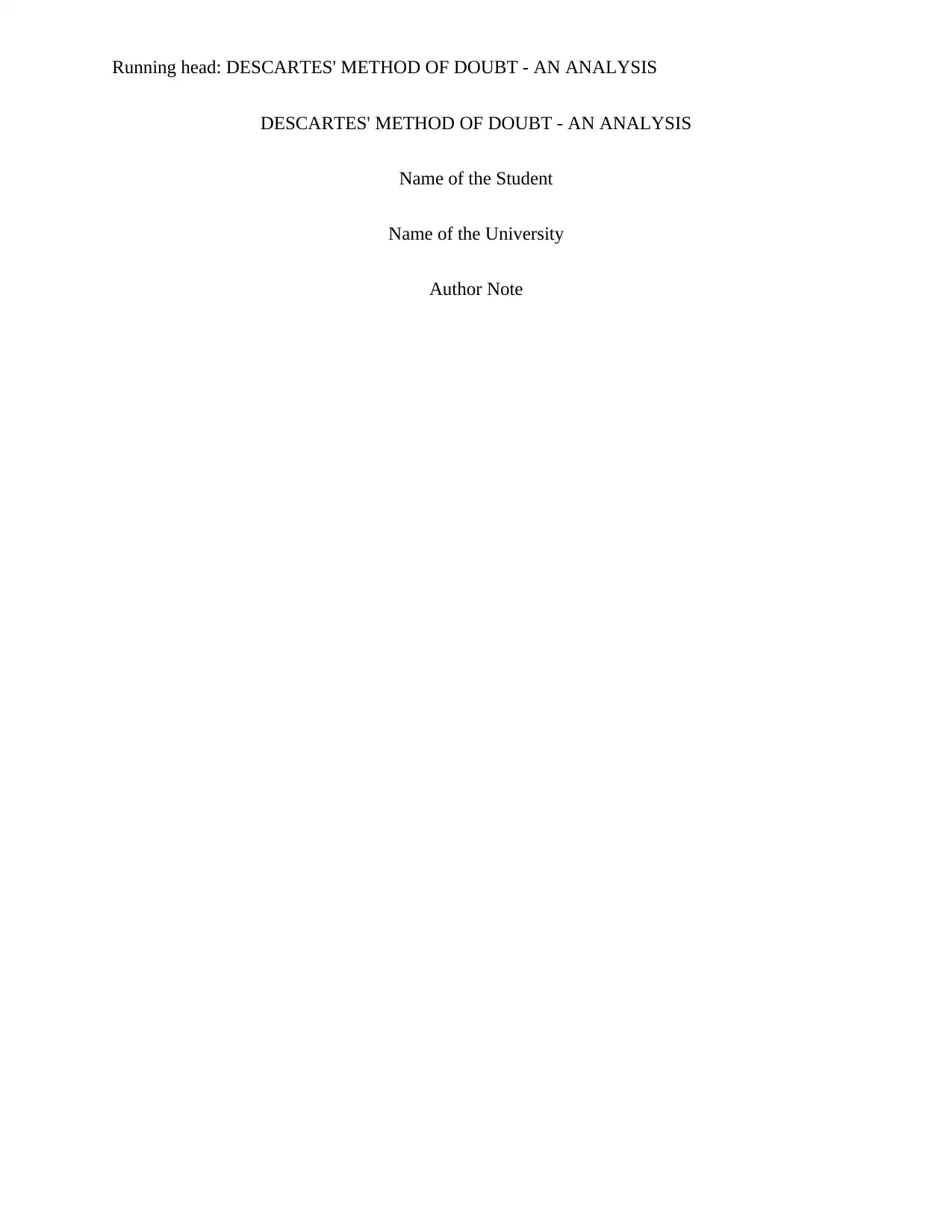
Running head: DESCARTES' METHOD OF DOUBT - AN ANALYSIS
DESCARTES' METHOD OF DOUBT - AN ANALYSIS
Name of the Student
Name of the University
Author Note
DESCARTES' METHOD OF DOUBT - AN ANALYSIS
Name of the Student
Name of the University
Author Note
Paraphrase This Document
Need a fresh take? Get an instant paraphrase of this document with our AI Paraphraser
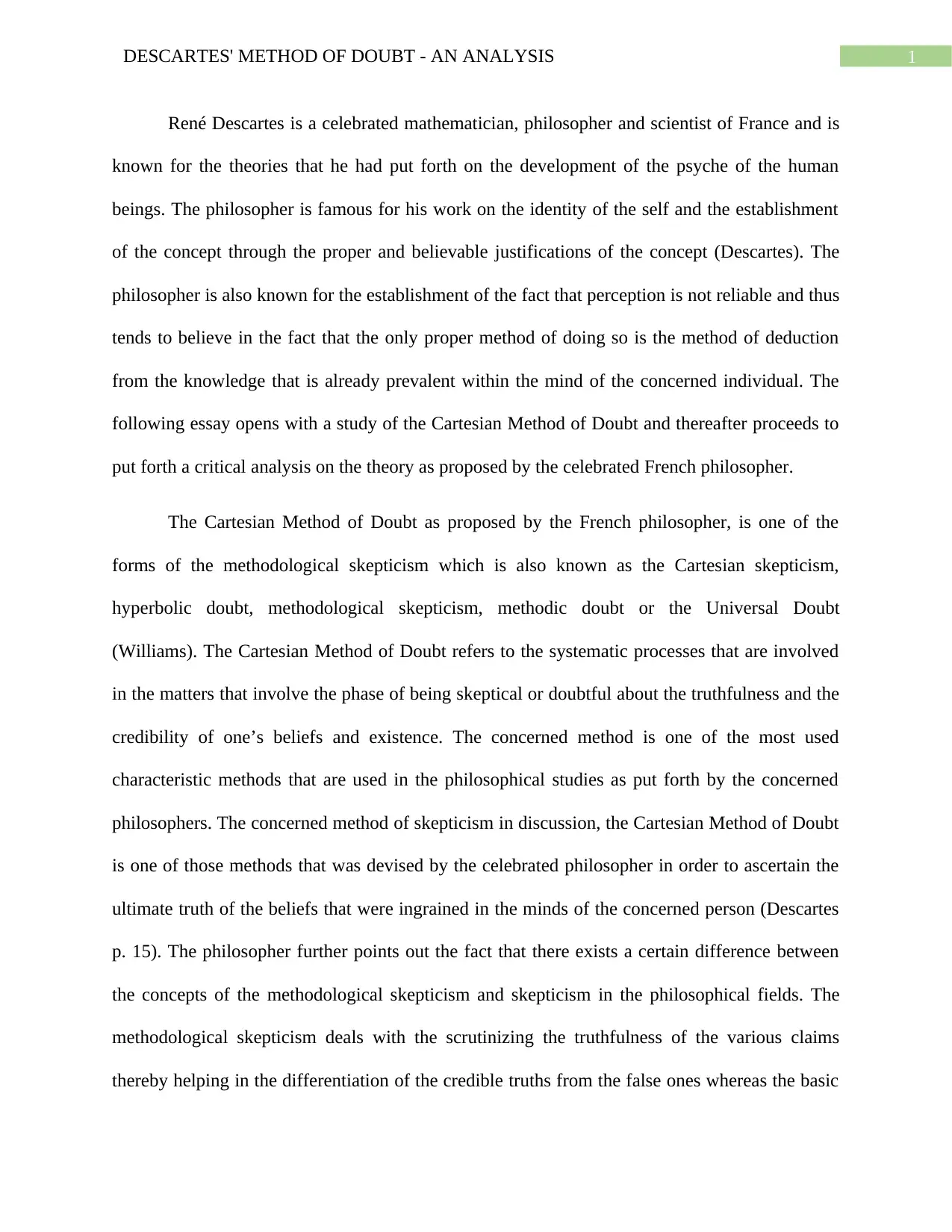
1DESCARTES' METHOD OF DOUBT - AN ANALYSIS
René Descartes is a celebrated mathematician, philosopher and scientist of France and is
known for the theories that he had put forth on the development of the psyche of the human
beings. The philosopher is famous for his work on the identity of the self and the establishment
of the concept through the proper and believable justifications of the concept (Descartes). The
philosopher is also known for the establishment of the fact that perception is not reliable and thus
tends to believe in the fact that the only proper method of doing so is the method of deduction
from the knowledge that is already prevalent within the mind of the concerned individual. The
following essay opens with a study of the Cartesian Method of Doubt and thereafter proceeds to
put forth a critical analysis on the theory as proposed by the celebrated French philosopher.
The Cartesian Method of Doubt as proposed by the French philosopher, is one of the
forms of the methodological skepticism which is also known as the Cartesian skepticism,
hyperbolic doubt, methodological skepticism, methodic doubt or the Universal Doubt
(Williams). The Cartesian Method of Doubt refers to the systematic processes that are involved
in the matters that involve the phase of being skeptical or doubtful about the truthfulness and the
credibility of one’s beliefs and existence. The concerned method is one of the most used
characteristic methods that are used in the philosophical studies as put forth by the concerned
philosophers. The concerned method of skepticism in discussion, the Cartesian Method of Doubt
is one of those methods that was devised by the celebrated philosopher in order to ascertain the
ultimate truth of the beliefs that were ingrained in the minds of the concerned person (Descartes
p. 15). The philosopher further points out the fact that there exists a certain difference between
the concepts of the methodological skepticism and skepticism in the philosophical fields. The
methodological skepticism deals with the scrutinizing the truthfulness of the various claims
thereby helping in the differentiation of the credible truths from the false ones whereas the basic
René Descartes is a celebrated mathematician, philosopher and scientist of France and is
known for the theories that he had put forth on the development of the psyche of the human
beings. The philosopher is famous for his work on the identity of the self and the establishment
of the concept through the proper and believable justifications of the concept (Descartes). The
philosopher is also known for the establishment of the fact that perception is not reliable and thus
tends to believe in the fact that the only proper method of doing so is the method of deduction
from the knowledge that is already prevalent within the mind of the concerned individual. The
following essay opens with a study of the Cartesian Method of Doubt and thereafter proceeds to
put forth a critical analysis on the theory as proposed by the celebrated French philosopher.
The Cartesian Method of Doubt as proposed by the French philosopher, is one of the
forms of the methodological skepticism which is also known as the Cartesian skepticism,
hyperbolic doubt, methodological skepticism, methodic doubt or the Universal Doubt
(Williams). The Cartesian Method of Doubt refers to the systematic processes that are involved
in the matters that involve the phase of being skeptical or doubtful about the truthfulness and the
credibility of one’s beliefs and existence. The concerned method is one of the most used
characteristic methods that are used in the philosophical studies as put forth by the concerned
philosophers. The concerned method of skepticism in discussion, the Cartesian Method of Doubt
is one of those methods that was devised by the celebrated philosopher in order to ascertain the
ultimate truth of the beliefs that were ingrained in the minds of the concerned person (Descartes
p. 15). The philosopher further points out the fact that there exists a certain difference between
the concepts of the methodological skepticism and skepticism in the philosophical fields. The
methodological skepticism deals with the scrutinizing the truthfulness of the various claims
thereby helping in the differentiation of the credible truths from the false ones whereas the basic
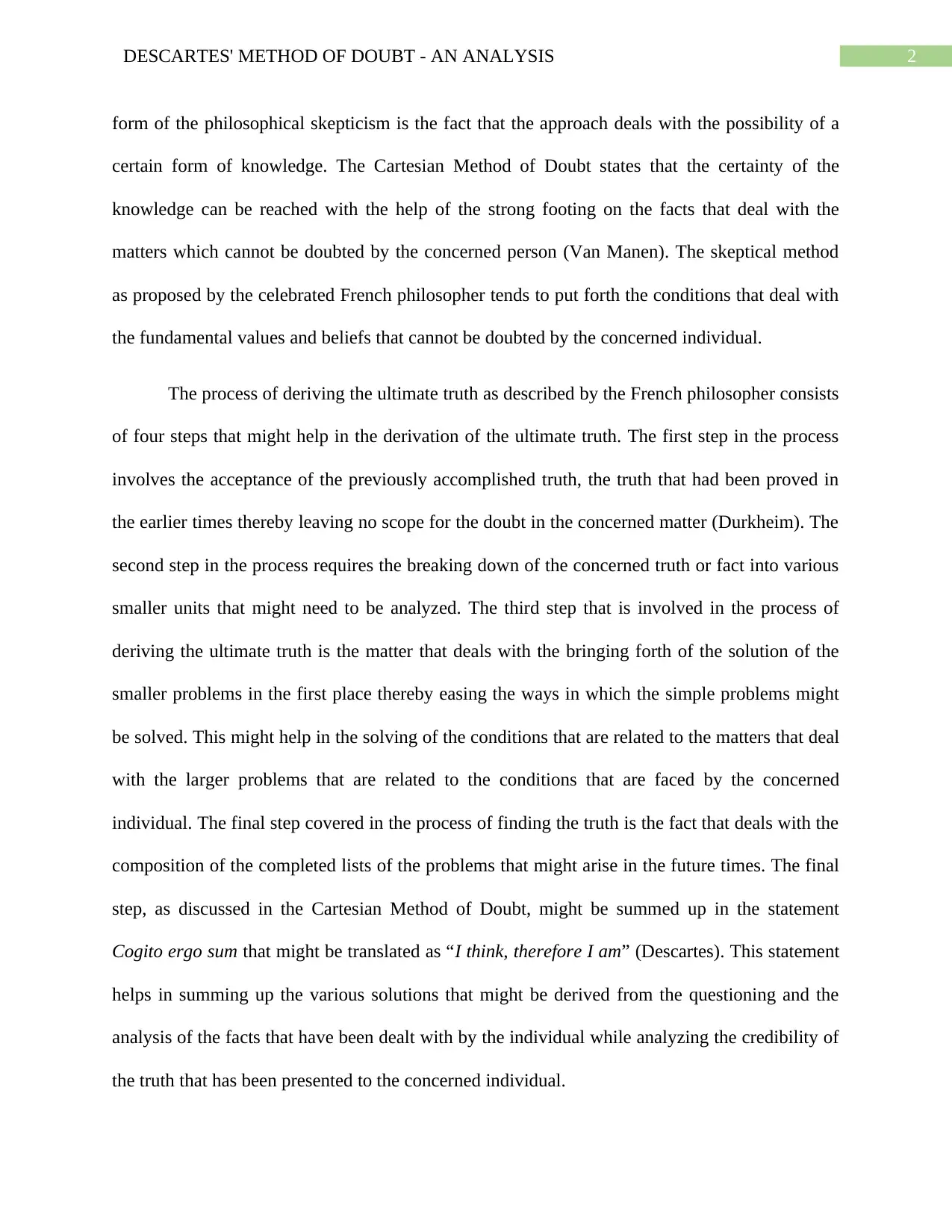
2DESCARTES' METHOD OF DOUBT - AN ANALYSIS
form of the philosophical skepticism is the fact that the approach deals with the possibility of a
certain form of knowledge. The Cartesian Method of Doubt states that the certainty of the
knowledge can be reached with the help of the strong footing on the facts that deal with the
matters which cannot be doubted by the concerned person (Van Manen). The skeptical method
as proposed by the celebrated French philosopher tends to put forth the conditions that deal with
the fundamental values and beliefs that cannot be doubted by the concerned individual.
The process of deriving the ultimate truth as described by the French philosopher consists
of four steps that might help in the derivation of the ultimate truth. The first step in the process
involves the acceptance of the previously accomplished truth, the truth that had been proved in
the earlier times thereby leaving no scope for the doubt in the concerned matter (Durkheim). The
second step in the process requires the breaking down of the concerned truth or fact into various
smaller units that might need to be analyzed. The third step that is involved in the process of
deriving the ultimate truth is the matter that deals with the bringing forth of the solution of the
smaller problems in the first place thereby easing the ways in which the simple problems might
be solved. This might help in the solving of the conditions that are related to the matters that deal
with the larger problems that are related to the conditions that are faced by the concerned
individual. The final step covered in the process of finding the truth is the fact that deals with the
composition of the completed lists of the problems that might arise in the future times. The final
step, as discussed in the Cartesian Method of Doubt, might be summed up in the statement
Cogito ergo sum that might be translated as “I think, therefore I am” (Descartes). This statement
helps in summing up the various solutions that might be derived from the questioning and the
analysis of the facts that have been dealt with by the individual while analyzing the credibility of
the truth that has been presented to the concerned individual.
form of the philosophical skepticism is the fact that the approach deals with the possibility of a
certain form of knowledge. The Cartesian Method of Doubt states that the certainty of the
knowledge can be reached with the help of the strong footing on the facts that deal with the
matters which cannot be doubted by the concerned person (Van Manen). The skeptical method
as proposed by the celebrated French philosopher tends to put forth the conditions that deal with
the fundamental values and beliefs that cannot be doubted by the concerned individual.
The process of deriving the ultimate truth as described by the French philosopher consists
of four steps that might help in the derivation of the ultimate truth. The first step in the process
involves the acceptance of the previously accomplished truth, the truth that had been proved in
the earlier times thereby leaving no scope for the doubt in the concerned matter (Durkheim). The
second step in the process requires the breaking down of the concerned truth or fact into various
smaller units that might need to be analyzed. The third step that is involved in the process of
deriving the ultimate truth is the matter that deals with the bringing forth of the solution of the
smaller problems in the first place thereby easing the ways in which the simple problems might
be solved. This might help in the solving of the conditions that are related to the matters that deal
with the larger problems that are related to the conditions that are faced by the concerned
individual. The final step covered in the process of finding the truth is the fact that deals with the
composition of the completed lists of the problems that might arise in the future times. The final
step, as discussed in the Cartesian Method of Doubt, might be summed up in the statement
Cogito ergo sum that might be translated as “I think, therefore I am” (Descartes). This statement
helps in summing up the various solutions that might be derived from the questioning and the
analysis of the facts that have been dealt with by the individual while analyzing the credibility of
the truth that has been presented to the concerned individual.
⊘ This is a preview!⊘
Do you want full access?
Subscribe today to unlock all pages.

Trusted by 1+ million students worldwide
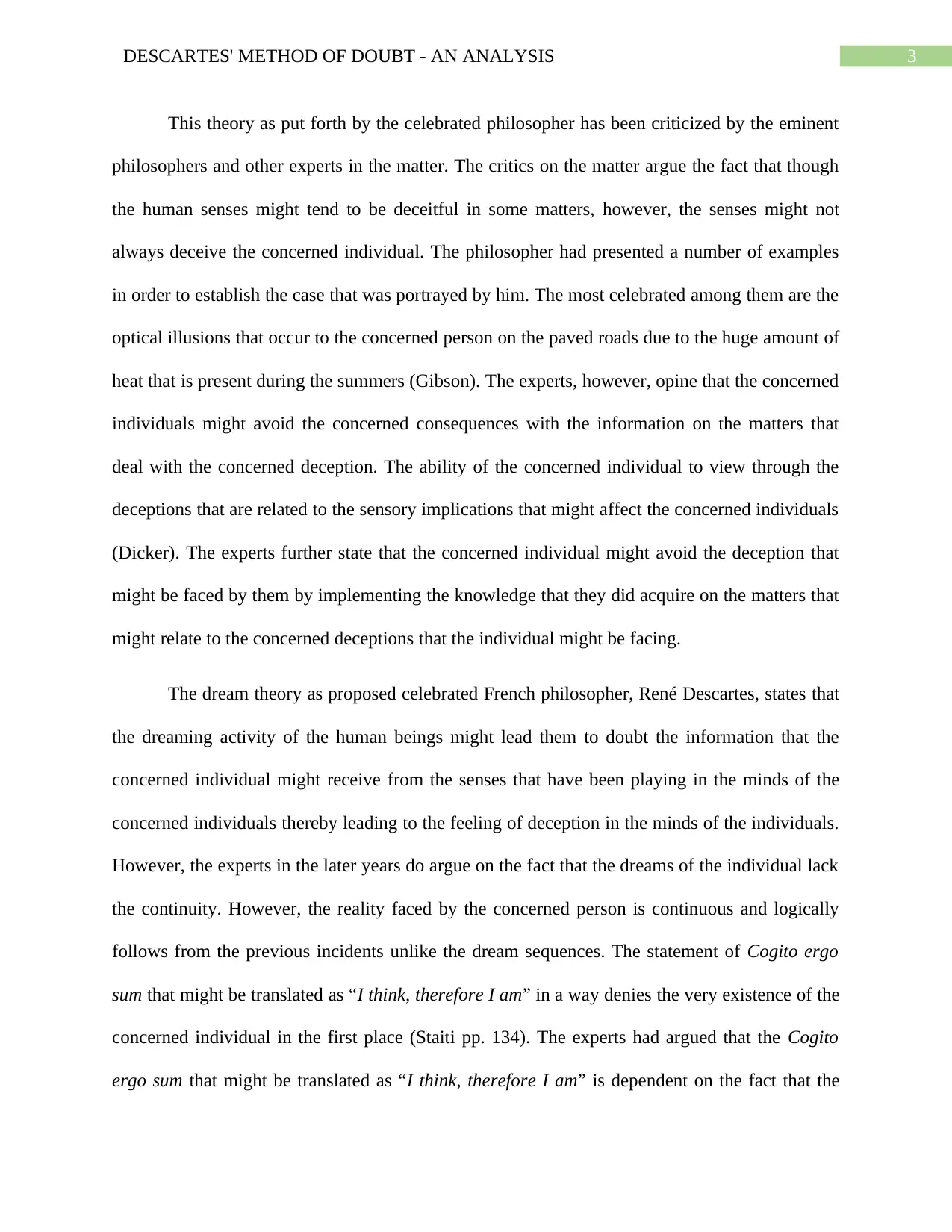
3DESCARTES' METHOD OF DOUBT - AN ANALYSIS
This theory as put forth by the celebrated philosopher has been criticized by the eminent
philosophers and other experts in the matter. The critics on the matter argue the fact that though
the human senses might tend to be deceitful in some matters, however, the senses might not
always deceive the concerned individual. The philosopher had presented a number of examples
in order to establish the case that was portrayed by him. The most celebrated among them are the
optical illusions that occur to the concerned person on the paved roads due to the huge amount of
heat that is present during the summers (Gibson). The experts, however, opine that the concerned
individuals might avoid the concerned consequences with the information on the matters that
deal with the concerned deception. The ability of the concerned individual to view through the
deceptions that are related to the sensory implications that might affect the concerned individuals
(Dicker). The experts further state that the concerned individual might avoid the deception that
might be faced by them by implementing the knowledge that they did acquire on the matters that
might relate to the concerned deceptions that the individual might be facing.
The dream theory as proposed celebrated French philosopher, René Descartes, states that
the dreaming activity of the human beings might lead them to doubt the information that the
concerned individual might receive from the senses that have been playing in the minds of the
concerned individuals thereby leading to the feeling of deception in the minds of the individuals.
However, the experts in the later years do argue on the fact that the dreams of the individual lack
the continuity. However, the reality faced by the concerned person is continuous and logically
follows from the previous incidents unlike the dream sequences. The statement of Cogito ergo
sum that might be translated as “I think, therefore I am” in a way denies the very existence of the
concerned individual in the first place (Staiti pp. 134). The experts had argued that the Cogito
ergo sum that might be translated as “I think, therefore I am” is dependent on the fact that the
This theory as put forth by the celebrated philosopher has been criticized by the eminent
philosophers and other experts in the matter. The critics on the matter argue the fact that though
the human senses might tend to be deceitful in some matters, however, the senses might not
always deceive the concerned individual. The philosopher had presented a number of examples
in order to establish the case that was portrayed by him. The most celebrated among them are the
optical illusions that occur to the concerned person on the paved roads due to the huge amount of
heat that is present during the summers (Gibson). The experts, however, opine that the concerned
individuals might avoid the concerned consequences with the information on the matters that
deal with the concerned deception. The ability of the concerned individual to view through the
deceptions that are related to the sensory implications that might affect the concerned individuals
(Dicker). The experts further state that the concerned individual might avoid the deception that
might be faced by them by implementing the knowledge that they did acquire on the matters that
might relate to the concerned deceptions that the individual might be facing.
The dream theory as proposed celebrated French philosopher, René Descartes, states that
the dreaming activity of the human beings might lead them to doubt the information that the
concerned individual might receive from the senses that have been playing in the minds of the
concerned individuals thereby leading to the feeling of deception in the minds of the individuals.
However, the experts in the later years do argue on the fact that the dreams of the individual lack
the continuity. However, the reality faced by the concerned person is continuous and logically
follows from the previous incidents unlike the dream sequences. The statement of Cogito ergo
sum that might be translated as “I think, therefore I am” in a way denies the very existence of the
concerned individual in the first place (Staiti pp. 134). The experts had argued that the Cogito
ergo sum that might be translated as “I think, therefore I am” is dependent on the fact that the
Paraphrase This Document
Need a fresh take? Get an instant paraphrase of this document with our AI Paraphraser
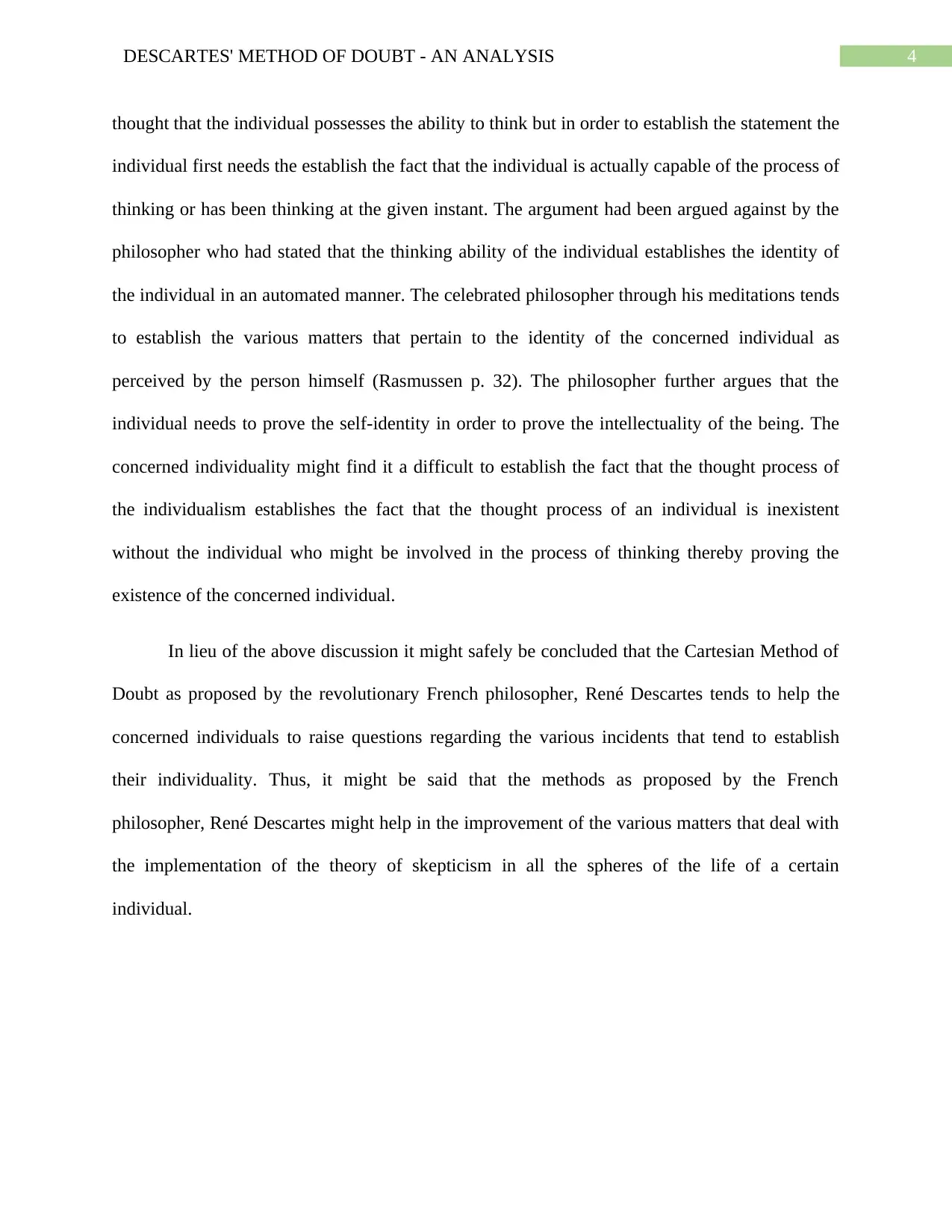
4DESCARTES' METHOD OF DOUBT - AN ANALYSIS
thought that the individual possesses the ability to think but in order to establish the statement the
individual first needs the establish the fact that the individual is actually capable of the process of
thinking or has been thinking at the given instant. The argument had been argued against by the
philosopher who had stated that the thinking ability of the individual establishes the identity of
the individual in an automated manner. The celebrated philosopher through his meditations tends
to establish the various matters that pertain to the identity of the concerned individual as
perceived by the person himself (Rasmussen p. 32). The philosopher further argues that the
individual needs to prove the self-identity in order to prove the intellectuality of the being. The
concerned individuality might find it a difficult to establish the fact that the thought process of
the individualism establishes the fact that the thought process of an individual is inexistent
without the individual who might be involved in the process of thinking thereby proving the
existence of the concerned individual.
In lieu of the above discussion it might safely be concluded that the Cartesian Method of
Doubt as proposed by the revolutionary French philosopher, René Descartes tends to help the
concerned individuals to raise questions regarding the various incidents that tend to establish
their individuality. Thus, it might be said that the methods as proposed by the French
philosopher, René Descartes might help in the improvement of the various matters that deal with
the implementation of the theory of skepticism in all the spheres of the life of a certain
individual.
thought that the individual possesses the ability to think but in order to establish the statement the
individual first needs the establish the fact that the individual is actually capable of the process of
thinking or has been thinking at the given instant. The argument had been argued against by the
philosopher who had stated that the thinking ability of the individual establishes the identity of
the individual in an automated manner. The celebrated philosopher through his meditations tends
to establish the various matters that pertain to the identity of the concerned individual as
perceived by the person himself (Rasmussen p. 32). The philosopher further argues that the
individual needs to prove the self-identity in order to prove the intellectuality of the being. The
concerned individuality might find it a difficult to establish the fact that the thought process of
the individualism establishes the fact that the thought process of an individual is inexistent
without the individual who might be involved in the process of thinking thereby proving the
existence of the concerned individual.
In lieu of the above discussion it might safely be concluded that the Cartesian Method of
Doubt as proposed by the revolutionary French philosopher, René Descartes tends to help the
concerned individuals to raise questions regarding the various incidents that tend to establish
their individuality. Thus, it might be said that the methods as proposed by the French
philosopher, René Descartes might help in the improvement of the various matters that deal with
the implementation of the theory of skepticism in all the spheres of the life of a certain
individual.
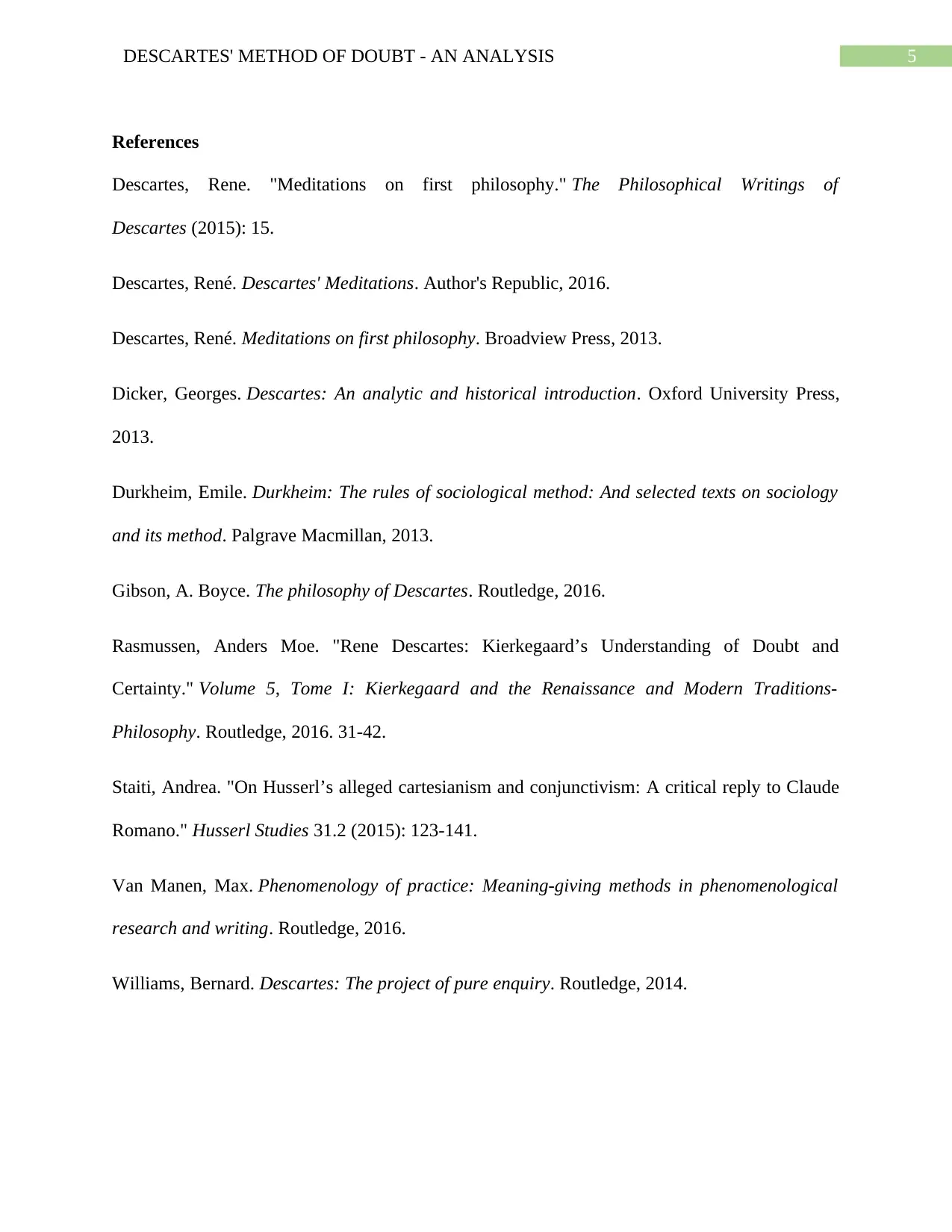
5DESCARTES' METHOD OF DOUBT - AN ANALYSIS
References
Descartes, Rene. "Meditations on first philosophy." The Philosophical Writings of
Descartes (2015): 15.
Descartes, René. Descartes' Meditations. Author's Republic, 2016.
Descartes, René. Meditations on first philosophy. Broadview Press, 2013.
Dicker, Georges. Descartes: An analytic and historical introduction. Oxford University Press,
2013.
Durkheim, Emile. Durkheim: The rules of sociological method: And selected texts on sociology
and its method. Palgrave Macmillan, 2013.
Gibson, A. Boyce. The philosophy of Descartes. Routledge, 2016.
Rasmussen, Anders Moe. "Rene Descartes: Kierkegaard’s Understanding of Doubt and
Certainty." Volume 5, Tome I: Kierkegaard and the Renaissance and Modern Traditions-
Philosophy. Routledge, 2016. 31-42.
Staiti, Andrea. "On Husserl’s alleged cartesianism and conjunctivism: A critical reply to Claude
Romano." Husserl Studies 31.2 (2015): 123-141.
Van Manen, Max. Phenomenology of practice: Meaning-giving methods in phenomenological
research and writing. Routledge, 2016.
Williams, Bernard. Descartes: The project of pure enquiry. Routledge, 2014.
References
Descartes, Rene. "Meditations on first philosophy." The Philosophical Writings of
Descartes (2015): 15.
Descartes, René. Descartes' Meditations. Author's Republic, 2016.
Descartes, René. Meditations on first philosophy. Broadview Press, 2013.
Dicker, Georges. Descartes: An analytic and historical introduction. Oxford University Press,
2013.
Durkheim, Emile. Durkheim: The rules of sociological method: And selected texts on sociology
and its method. Palgrave Macmillan, 2013.
Gibson, A. Boyce. The philosophy of Descartes. Routledge, 2016.
Rasmussen, Anders Moe. "Rene Descartes: Kierkegaard’s Understanding of Doubt and
Certainty." Volume 5, Tome I: Kierkegaard and the Renaissance and Modern Traditions-
Philosophy. Routledge, 2016. 31-42.
Staiti, Andrea. "On Husserl’s alleged cartesianism and conjunctivism: A critical reply to Claude
Romano." Husserl Studies 31.2 (2015): 123-141.
Van Manen, Max. Phenomenology of practice: Meaning-giving methods in phenomenological
research and writing. Routledge, 2016.
Williams, Bernard. Descartes: The project of pure enquiry. Routledge, 2014.
⊘ This is a preview!⊘
Do you want full access?
Subscribe today to unlock all pages.

Trusted by 1+ million students worldwide
1 out of 6
Related Documents
Your All-in-One AI-Powered Toolkit for Academic Success.
+13062052269
info@desklib.com
Available 24*7 on WhatsApp / Email
![[object Object]](/_next/static/media/star-bottom.7253800d.svg)
Unlock your academic potential
Copyright © 2020–2025 A2Z Services. All Rights Reserved. Developed and managed by ZUCOL.




